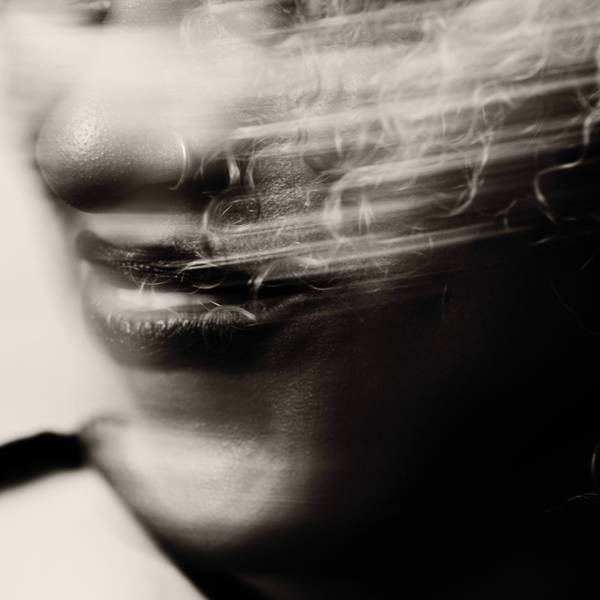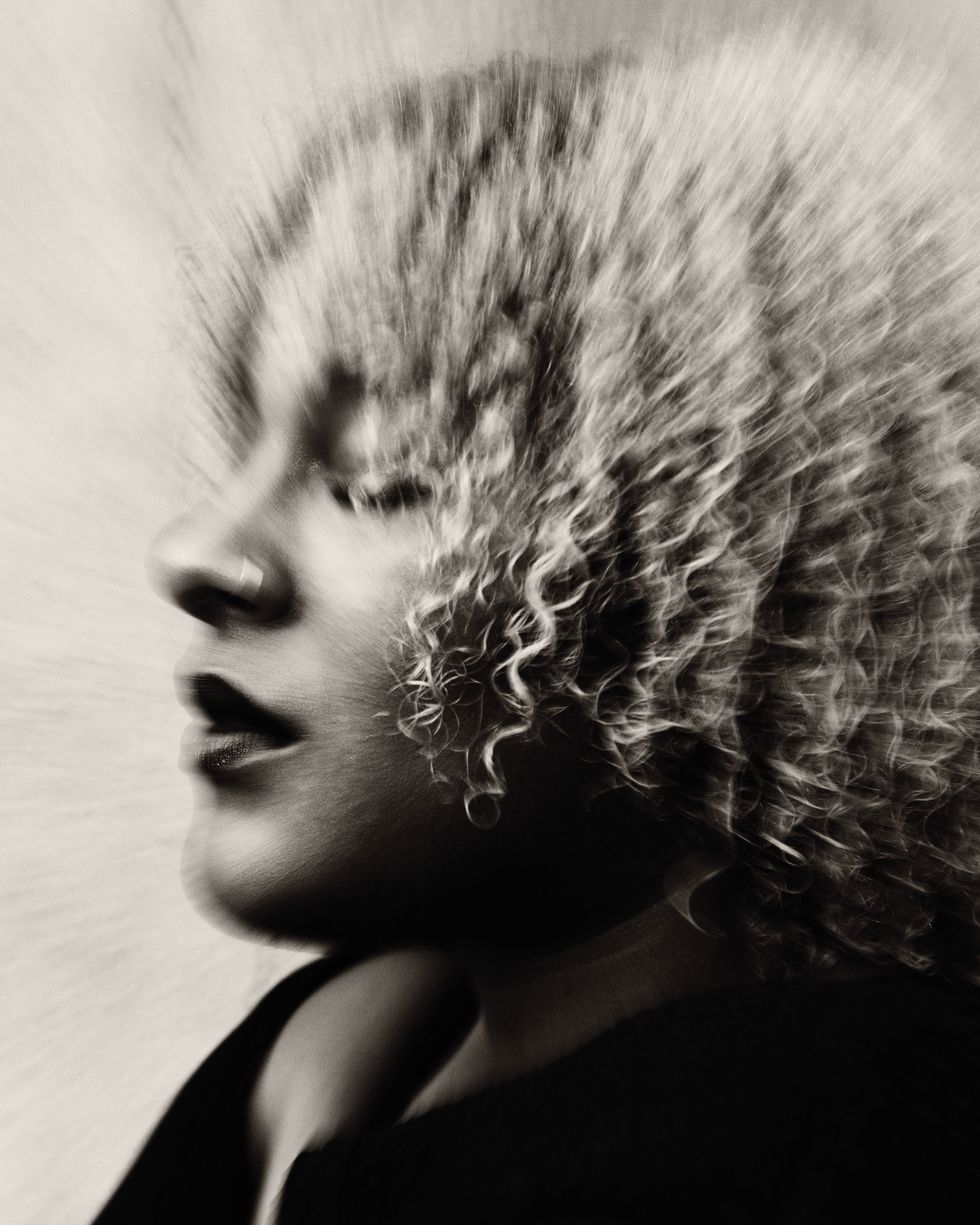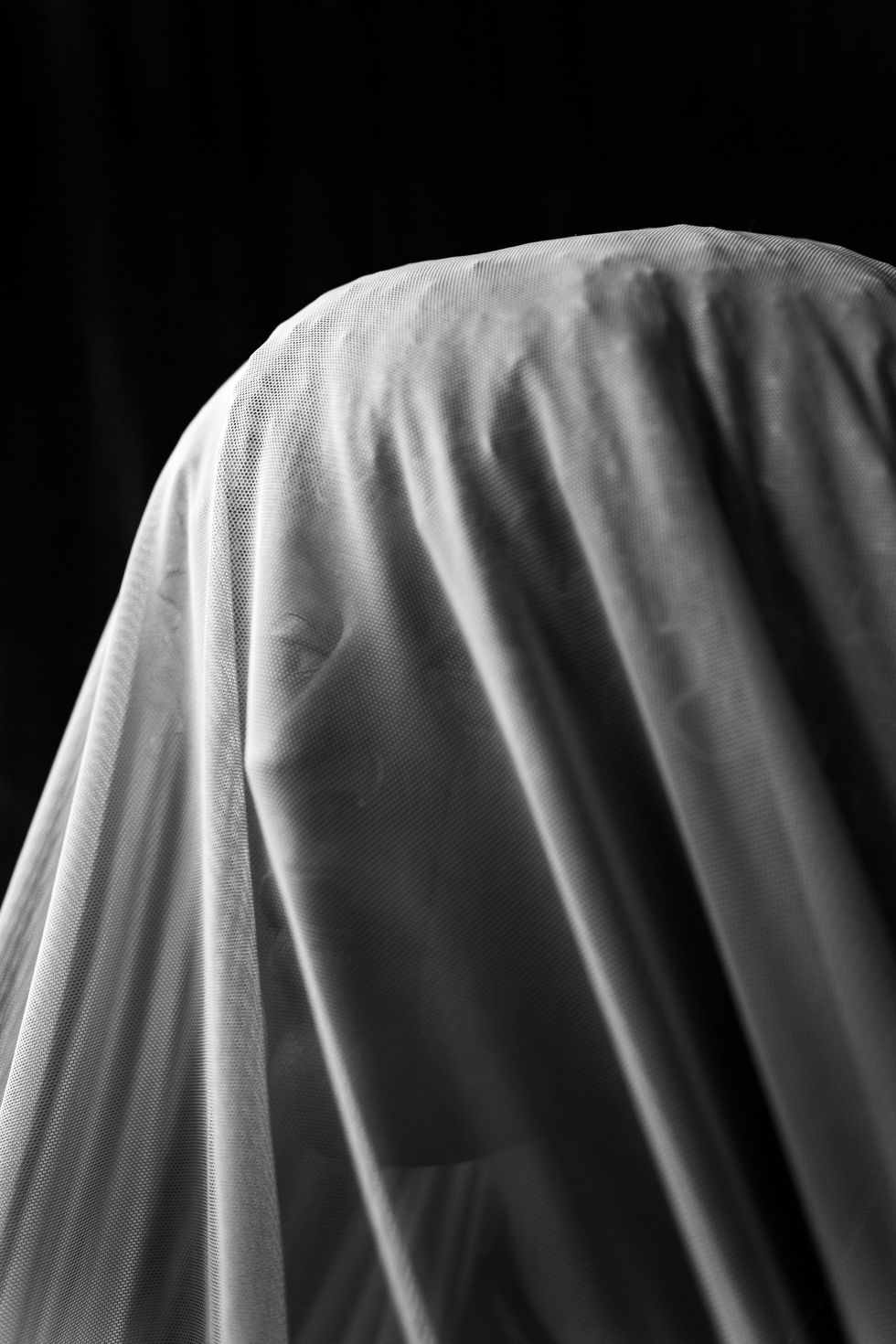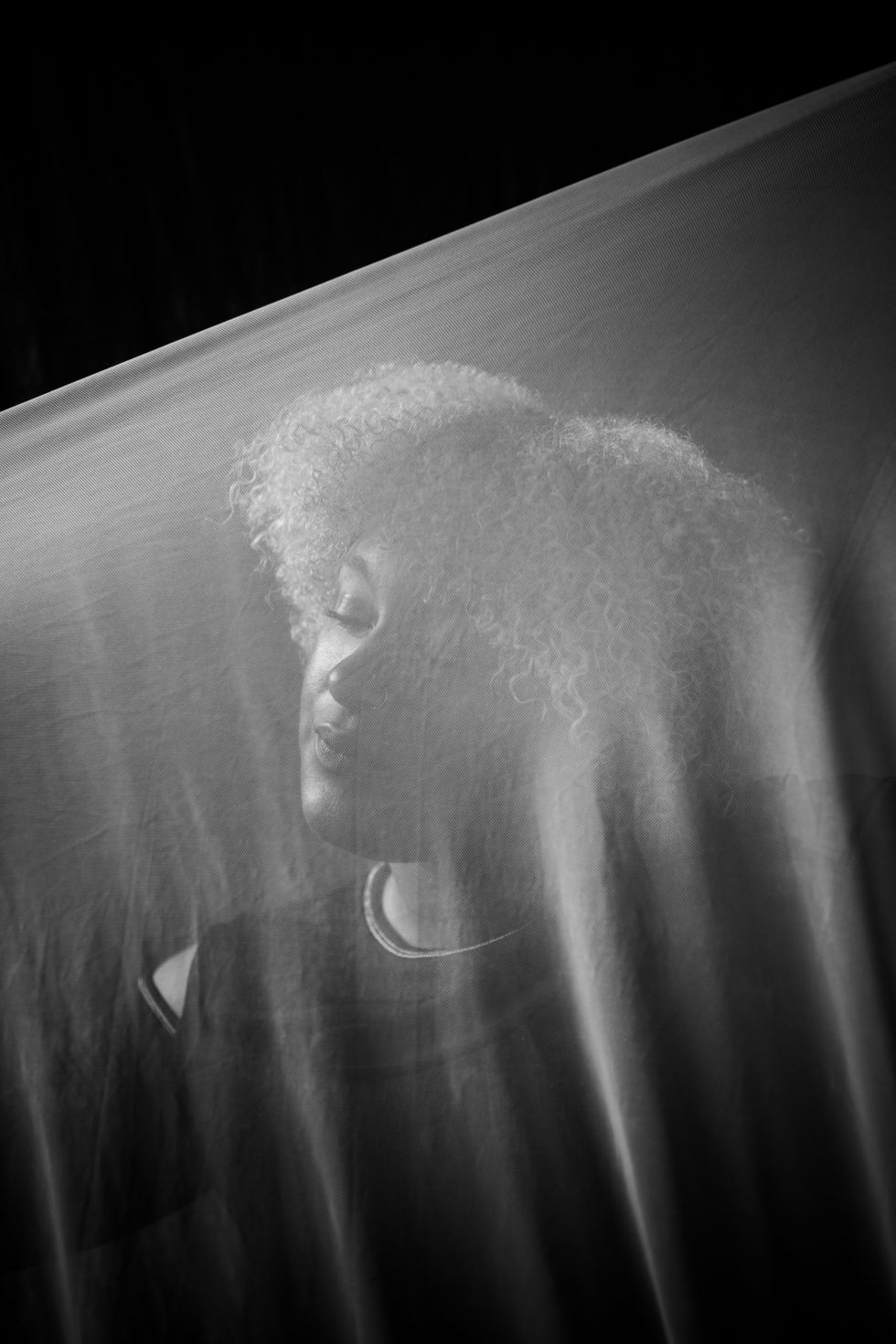
L'Rain Shifts Perspectives at the Whitney Biennial
BY HARRY TAFOYA
Dec 07, 2023
If you decide one afternoon to ride the train into the city and take a tour through Chelsea’s art galleries, it’s more likely than not that you’ll end up at 14th Street station and face-to-face with Tom Otterness’ obnoxiously twee Life Underground sculptures. The clumsy bronze figures are meant to be whimsical, like rejects from an early Disney movie, but they are steeped in complication by the fact that in 1977 the artist filmed himself shooting a dog as a horrifically misguided “punk” statement. In this way, it’s a more perfect gateway to the art world than the artist might have intended, an outwardly playful, utterly brutal marker that leaves a distinct taste of blood in your mouth.
When Taja Cheek croons the title of “I Killed Your Dog” off her third album of the same name, she does so with infinitely more complexity and humanity and knowingness. The violence is suggested but still shocking, and it’s made all the more disarming by the horrible calm with which she coveys it. Cheek wants you to consider the passion and pathos that would provoke someone to destroy something precious, using her rich, dusky voice to draw her listeners close before absolutely shattering their complacency. As the song swirls into a woozy climax, she flips the lyric and twists the knife one more time: “I am your dog.”
When PAPER speaks to the musician and curator, she’s just returned home to Brooklyn after a leg of touring on the West Coast and looks positively sunny. Far from the intense narrator of her title track, she’s breezy and all smiles, throwing her head back and laughing as she bounces her well-loved and incredibly named Havanese/poodle mix, Icon, on her knee.
As L’Rain, Cheek has made a specialty of synthesizing dissonant sounds and overwhelming emotions into gorgeously hypnotic records, drawing from a library of voice memos, Soundcloud sketches and her own diverse musical background to create jarringly beautiful audio collages. After processing grief on her last two albums, Cheek aimed to create a “basic bitch” record, one that threw heady conceptualism out the window and fucking rocked instead. It’s a testament to her intelligence and creativity that I Killed Your Dog works on both levels. The guitars on “Pet Rock”’ shred harder than almost any release this year, while also working as a barbed critique against the erasure of the genre’s Black roots. “5 to 8 Hours (WWwaG)” is psychedelic folk music that works like a magician’s sleight of hand, lifting you into the air before submerging you deep into her stream of consciousness.
Above all, I Killed Your Dog is a feat of curation, a collection of disparate parts that are skillfully arranged to reveal a fantastically complex whole. Rather than settling for simply being accomplished in one field, Cheek has also maintained her day job as a curator for organizations like MoMA PS1, The Highline and Creative Time. Next year, Cheek will embark on her most high-profile gig to date as a curator of performance art for the 2024 Whitney Biennial. Institutional shows are usually pretty bloodless affairs, but the Whitney Biennial has been a reliable lightning rod for debate, combining the glitz of the Met Gala with the fervor of Wrestlemania. If the boldness of her music is any indication, Cheek is poised to make one of her most audacious statements yet.

Where did the title I Killed Your Dog come from?
It came from the place of loving dogs, ironically and I kind of knew as I was writing the record that it was going to be sort of loosely about relationships and about breakups. I wanted the title to reflect some of that awful feeling of hurting people that you're close to. Also the live show can be chaotic and loud and noisy and I can be chaotic and loud and noisy and I wanted the title to reflect that and to position me as an unreliable narrator.
Dark humor is a large part of the record and your vocabulary for passion is quite violent. What inspired you to frame it in those terms?
I think it's somewhat of an alter ego of mine and it's aspirational. I am just generally a very passionate person and I often lead with emotion rather than logic. I'm an artist who has had a lot of very professional day jobs and I've had to present in a very particular way. I've seen the spaces that I have access to and the way my music is treated within them and I felt a little claustrophobic and I wanted to — it's not even like this album is like super rebellious — but I wanted to have a little bit of a "Fuck you, I'm wilder than this space" or "I'm wilder than the spaces that I'm being put into" and to test the waters of that a little bit. That's less about the content of the record and more about me as an artist but oftentimes those things blur in my work because I'm using L'Rain as a platform to work through my own shit as a person and also as an artist, which are just the same.
Was it a matter of the audience itself or a matter of how your work was packaged? What was making you feel claustrophobic?
I think it's because I also work in the art world and I know that world fairly well. Sometimes we're in museums or certain spaces that aren't rock clubs where I also play and just wanting to bite back a little bit and be like, "Yeah, this might be a little difficult for you to talk about and that's what I want." I want it to be a little bit difficult, a little bit uncomfortable and weird. I think a lot of good things can come from discomfort and I'm generally a person who avoids discomfort at all costs. But this is a way for me to live in that. don't think any sort of museum is gonna be like, "Oh, your album's called I Killed Your Dog you can't perform here." But it's more aspirational or more conceptual in a way and that felt important to me nonetheless.
One way I think you might experience an album like I Killed Your Dog in an institutional setting would be having the title but the language around it would be so watered down that you couldn't experience the full force of it, right?
Totally, totally. It also operates on a plane of, I don't know... There are a lot of conversations about "fragility" and "white fragility," and there is the archetype of the nice mom walking her dog and being so afraid of the dog getting hurt. I think about the ways people get lost in these conversations or the way that I'm just critiquing what people hold dear and what people care about. Also it's funny to me that I think there are a couple of times where people would comment and they're like, "Oh, she must be the most disgusting person ever. She must be a freak. She must be, really gross." It's very funny that musicians are sometimes expected to tell the truth or [their music] has to be a real representation of what they really believe in.

I feel like that experience would really give you a certain amount of empathy when bringing in other artists as well. Do you feel a certain amount of responsibility for taking people by the hand and saying, "Okay, I'm going to help you enter into this space?"
Totally. Especially in a place like [MoMA], I feel like that was my whole job, navigating that as best as I could. I think curators have a responsibility to audiences as much as they do artists and that can be a really tough place to be. Because sometimes what an artist needs is the exact opposite of what an audience needs and you have to figure that out. It's funny, I hadn't actually thought about it in that way but yes, I feel like that's the majority of what I've had to do. Also work that interests me requires me to have to do that because I think that's the work that ultimately is transformative for everybody involved. It ends up transforming culture when we're being pushed up against difficult boundaries.
You’ve called this your “basic bitch record,” what do you mean by that definition?
The "basic bitch record "is me using hyperbole, as I often do. I'm acknowledging that this record is probably more approachable than other records. There are certain things from a writing standpoint, but also from a production and mixing standpoint that make it more accessible. I think for me also it was the basic premise of wanting to talk about love and relationships like a Taylor Swift record. I don't know. My music probably is a little bit heady, but I don't think of it that way and that's not where it comes from. It comes from a deeply emotional place. Part of it is me marketing it or maybe being aspirational, being like: "Yeah, it's my basic bitch record. I'm talking about the same things all these pop stars are talking about." It's more accessible and I think that's something I grapple with.
Are you a Swiftie?
I am not, I don't know any Taylor Swift at all. I just know that she talks about her exes a lot in her music, so that's always the first person that comes to mind.
You've had multiple experiences working with other artists and I'm curious about what is it like to be both a musician and an artist in art spaces as opposed to a club or a concert?
I feel like I used to deny myself the ability to recognize myself as an artist in those scenarios and often would try to split myself in half. That pressure was mostly self-imposed, but sort of vaguely institutionally imposed. In a way I just feel a sense that institutions are generally distrustful of artists, even the ones that like present work by artists and force people to choose an identity or a path, even though there are so many curators who were artists or studied as artists or still consider themselves artists, or the art handlers that are in all of these institutions that are usually artists and that's why they're able to care for these works in the ways that they do. The interns are artists, so many people are artists, but we're sort of forced to professionalize in a way that requires denial of a major part of ourselves. But lately, I've been able to be my full self and that feels really good because it's all water from the same well.
Beautiful. This brings me to the big question, which is can you tell me about the Whitney Biennial? What are your responsibilities going to be for it and how do you feel?
I feel a lot of things. As a baby in the art world, the Whitney Biennial and Performa, all were very large to me and so there's something about it that feels like a full circle moment, even though I've never worked at the Whitney. I have performed there a few times over the years and it's funny, I think I have a lot of institutional skepticism that I hope makes me better at my job. But at the same time, it's a huge honor not only to be working on the Biennial but to be working on the Biennial with the curators that I am working with because I really deeply respect them and have had an incredible time talking to them about the ideas and the practicalities of bringing this to life. I'm specifically working on performance with an emphasis on sound and music. It's really cool that they care about it in the way they do and that they both trust me, but also are actually really, really being present and engaging with all the things that there are to think about when you're putting together a Biennial. It feels very special. I feel like all of the artists I love and enjoy working with are skeptical of institutions, as am I. So it's also just a funny moment.

The Whitney Biennial is about providing a snapshot of where American art is in 2024, right? What are the major thematics that have been interesting to you? What currents of culture have really been occupying your mind?
When the pandemic started, I started thinking a lot about clowns. It sounds really crazy, but I was thinking a lot about clowning and public space and clowns are interesting to me, especially because they're able to reveal and reflect a lot about society without getting the flack for giving those kinds of scathing critiques. And there's something democratic about the way that they're able to present those messages. They talk to children so there's something that just feels very approachable about them. I was working at Luna Luna for a while so I was really deep into thinking about clowning and circus performers. Also, my mind has been on the collapse of society and who better to talk about the collapse of society than a maniacal clown? For me, I'm a clown. I'm thinking about healing. There are some artists that have particular relationships to other artists in the show. There's a lot of thinking through indigenity. There's a lot of thinking about America itself, complicating what that is. There are artists who are immigrants or are connected to immigrant histories in particular ways or are expats. There's a lot about community and mentorship and lineages of artists that I'm thinking about. For the most part, I'm interested in artists that are thinking cross-disciplinarily.
You've said before that experimental music is something you don't want to be too precious about. Do you feel that way about curation too?
Yeah, you know, museums are public spaces. They have always been places that feel like they're rarefied spaces where you have to have a certain kind of knowledge, a certain level of knowledge to be able to enter them and to enjoy those spaces. But that's not true and that's not true for galleries either but a lot of people don't know that. I think that's really one big failure among many big failures of all of these spaces. So I try to make myself as available as possible. Oftentimes young kids will DM me and they're like: "Hey, I really want to be a curator and I just don't know how to do it, can I just talk to you about it for a little bit? I don't know if what I'm doing makes sense." I also think curators should be open to seeing new things. There's a culture amongst curators that's like: "Oh yeah I know that! Oh yeah, I've seen that. Oh yeah, I do that." But I think it's actually more interesting to admit the things you don't know and to be open to learning new things and to be open to submissions and to see things without any expectation of what you're going to see. These all seem like really basic things, but so much of the culture of being in the art world and being in museums is about, frankly, bullshit. It takes a lot of unlearning to get that out of your head. I feel like I'm still doing a lot of unlearning and figuring out how I can make things more accessible. Also there are limits to that. It's important to acknowledge that museums aren't suddenly going to become a playground but, you know I'm just working as hard as I can to do the little bits that I can.
Photography: Courtney Sofia Yates and Alice Plati
Related Articles Around the Web
MORE ON PAPER
ATF Story
Madison Beer, Her Way
Photography by Davis Bates / Story by Alaska Riley
Photography by Davis Bates / Story by Alaska Riley
16 January
Entertainment
Cynthia Erivo in Full Bloom
Photography by David LaChapelle / Story by Joan Summers / Styling by Jason Bolden / Makeup by Joanna Simkim / Nails by Shea Osei
Photography by David LaChapelle / Story by Joan Summers / Styling by Jason Bolden / Makeup by Joanna Simkim / Nails by Shea Osei
01 December
Entertainment
Rami Malek Is Certifiably Unserious
Story by Joan Summers / Photography by Adam Powell
Story by Joan Summers / Photography by Adam Powell
14 November
Music
Janelle Monáe, HalloQueen
Story by Ivan Guzman / Photography by Pol Kurucz/ Styling by Alexandra Mandelkorn/ Hair by Nikki Nelms/ Makeup by Sasha Glasser/ Nails by Juan Alvear/ Set design by Krystall Schott
Story by Ivan Guzman / Photography by Pol Kurucz/ Styling by Alexandra Mandelkorn/ Hair by Nikki Nelms/ Makeup by Sasha Glasser/ Nails by Juan Alvear/ Set design by Krystall Schott
27 October
Music
You Don’t Move Cardi B
Story by Erica Campbell / Photography by Jora Frantzis / Styling by Kollin Carter/ Hair by Tokyo Stylez/ Makeup by Erika LaPearl/ Nails by Coca Nguyen/ Set design by Allegra Peyton
Story by Erica Campbell / Photography by Jora Frantzis / Styling by Kollin Carter/ Hair by Tokyo Stylez/ Makeup by Erika LaPearl/ Nails by Coca Nguyen/ Set design by Allegra Peyton
14 October




